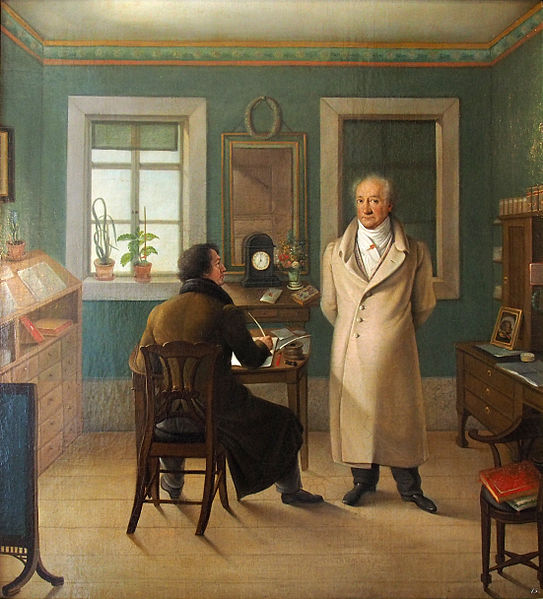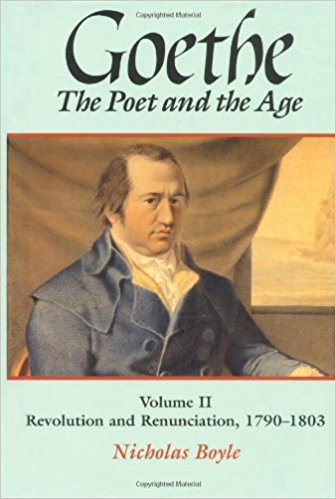Don’t invite Goethe to dinner! Here’s why.
Sunday, January 7th, 2018
Was he a schmuck?
Was the glory of Goethe just a 19th-century invention, pumped up for a resurgent Germany that craved a national hero? Ferdinand Mount makes the case in the New York Review of Books, where he is reviewing Rüdiger Safranski‘s Goethe: Life as a Work of Art, newly translated into English.
Johann Wolfgang von Goethe was not, to put it mildly, the sort of fellow you’d want to have over for dinner. Not if you valued your crockery. He had to be prettified and cleaned up massively to become the national bard:
Herr Glaser of Stützerbach was proud of the life-sized oil portrait of himself that hung above his dining table. The corpulent merchant was even prouder to show it off to the young Duke of Saxe-Weimar and his new privy councilor, Johann Wolfgang Goethe. While Glaser was out of the room, the privy councilor took a knife, cut the face out of the canvas, and stuck his own head through the hole. With his powdered wig, his burning black eyes, his bulbous forehead, and his cheeks pitted with smallpox, Goethe must have been a terrifying spectacle. While he was cutting up his host’s portrait, the duke’s other hangers-on were taking Glaser’s precious barrels of wine and tobacco from his cellar and rolling them down the mountain outside. Goethe wrote in his diary: “Teased Glaser shamefully. Fantastic fun till 1 am. Slept well.”
Goethe’s company could be exhausting. One minute he would be reciting Scottish ballads, quoting long snatches from Voltaire, or declaiming a love poem he had just made up; the next, he would be smashing the crockery or climbing the Brocken mountain through the fog. Only in old age, and more so in the afterglow of posterity, did he take on the mantle of the dignified sage. Yet even late in life, he remained frightening. His daughter-in-law, Ottilie, whom he insisted on marrying to his son August, though they were not in love and got on badly, admitted that she was terrified of him.
He alarmed people as much as he charmed them, not only by his impatience, his sudden flare-ups, and his unpredictable antics, but by his foul language. In moments of exasperation he would denounce as a shithead any of the great men who had assembled at Weimar—Wieland, Herder, Schiller. The best-remembered line from his first play, Götz von Berlichingen, is the robber baron Götz shouting through the window to the emperor’s messenger: “Tell his Imperial Majesty that he can lick my arse”—otherwise known as the Swabian salute. Goethe’s Venetian Epigrams cheerfully skitter through masturbation, sodomy, and oral sex, with sideswipes at coffee shops and yo-yos (one of the first mentions of the toy).
 I made the dutiful trek to Weimar some years ago, clipped a small tendril of the vine outside his house to take back home, but once on my windowsill it loyally refused to thrive in California – or perhaps America generally, for in the Anglophone world, Goethe is still more honored than read. I always attributed this neglect to the difficulty of translating his lyric poetry.
I made the dutiful trek to Weimar some years ago, clipped a small tendril of the vine outside his house to take back home, but once on my windowsill it loyally refused to thrive in California – or perhaps America generally, for in the Anglophone world, Goethe is still more honored than read. I always attributed this neglect to the difficulty of translating his lyric poetry.
I found his early (1774) and influential Sorrows of Young Werther a tedious exercise in self-pity. As Mount writes, “The copious weeping, the unbridled privileging of personal feeling, the letter format—all these are characteristic of the eighteenth-century novel of sensibility … and the novel is drenched in the possibility of suicide.” I was willing to suspend judgment and view it as an artifact of a certain sensibility. Elective Affinities, which I’ve read several times, was philosophically meatier and less morose, but, like Mount, I remain “baffled by its implausibilities: the extraordinary stilted talk between the husband and wife, Eduard and Charlotte, the failure of anyone to notice that beautiful Ottilie is starving herself to death, the immunity of her lovely corpse to the normal processes of decomposition. The central conceit that the characters are attracted to one another by a quasi-chemical process seems to me to lack any shock value, since they are such inert substances to begin with.” And Iphigenia at Taurus, with its long stand-and-deliver speeches? Schiller’s Mary Stuart seems just as good with far less fanfare. I enjoyed the Eckermann’s conversations, and also saw where the stand-and-deliver came from: the man himself. The verse. What about the verse… I prefer Rilke or Hölderlin.
Shall I make a full confession? I’ve only read snatches of Faust, and am far more familiar with Gounod‘s version than Goethe’s, with it’s stunning ensemble finale. I still need to make a concerted effort for Faust.
 The upshot of Mount’s lively, insightful, and enviably excellent review: he seems to favor Nicholas Boyle’s “mighty undertaking, which has already occupied two volumes (1991 and 2000), each slightly longer than Safranski’s, with another twenty-nine years of Goethe’s life still to go.”
The upshot of Mount’s lively, insightful, and enviably excellent review: he seems to favor Nicholas Boyle’s “mighty undertaking, which has already occupied two volumes (1991 and 2000), each slightly longer than Safranski’s, with another twenty-nine years of Goethe’s life still to go.”
“Safranski does not begin to measure up to the depth and subtlety of Boyle’s analysis. On the other hand, he says certain things plainly that Boyle tends to blur or omits altogether—like the story of Herr Glaser. After reading Safranski, we are enlightened, amused, and impressed but rather less inclined to take Goethe’s life as nonpareil, while still regarding him as a wonderful writer.” Which is handy. Because I’ve dutifully kept Volume II in my book hoard for well over a decade. It’s there, on the bookshelf in front of me, where it’s spine is still unbroken and its pages still virginal.
Mount gives the Goethe legend a radical debunking – harsh, but he ends on an ultimately humane note. He recalls that Nietzsche extolled the German poet as “a man to whom nothing is forbidden, except it be weakness, whether that weakness be called vice or virtue.” Mount concludes: “Give me a little weakness every time. Hardness only leads to hardness. I am not the first to note that included among the sights of Weimar in the Michelin Green Guide is Buchenwald.”
Read the whole thing here.
Postscript on 1/8/2017: A number of voices weighed in on the social media about this post – pro, con, and somewhere in the middle. Here are a few of them.

Elena
Elena Danielson, former director of the Hoover Institution Library & Archives: Have you read the West-Oestlicher Divan? When I was reading lots of German in grad school, I couldn’t get enough Rilke, Heine, et al. I only read Faust and Werther because it was all so amusingly overwrought. And then it was just speed reading to get through. I reluctantly had to take the Divan course because the chairman taught it. I sat in the back. But the Divan unexpectedly swept me away. Maybe you have to be under 30. Maybe you have to read it in German. “Gingo Biloba” is probably the best known.They grow Gingo trees in Weimar in honor of the little three-stanza poem. JWvG smuggled in two poems by his girlfriend, who would have been in difficulties if her family knew….
Early Goethe was high spirited and into Sturm und Drang. I prefer the late Goethe of the simple but sublime West-oestlicher Divan. But he was excellent company throughout his life, despite what the NYRB article claims. He had to flee the court in secret and travel anonymously south to escape all his admirers. But made even more friends in Rome. There was no Germany in his lifetime. And Buchenwald was a forest.
Jim Erwin: Not sure if I got this from Eckermann or elsewhere, but none of this is surprising. His extremities of behavior and sentiment, paired with his devotion to aristocracy which functioned as a substitute for knowing which side his bread was buttered on is what made him an icon of Romanticism. In some respects he was a court jester in that he knew how to ingratiate himself to nobles powerful enough to protect him from the lesser nobles he savaged. He also lived in an age that was, in the right social circles, quite libertine. Group nude bathing was normal and group sex not uncommon. They knew how to party like it’s 1799.
Eckermann probably whitewashed many of Goethe’s eccentricities and outbursts (a 19th century Seanpicer?), but he wrote clearly about how nearly everyone admitted to his home to meet him was nearly incontinent with fear from Goethe’s reputation of, verbally at least, ripping people to shreds if he did not like them.
Paul Achitoff, lawyer: I think the piece’s POV is that Goethe was greatly overrated, and therefore presents its case. I’ve never been a Goethe fan, but I think some of his work, while rejected by the conventional scientists, was of great interest to some with broader minds. His work on morphology is often cited as a precursor of Darwin, and his color theory was admired by Wittgenstein, Godel, and Schopenhauer.






